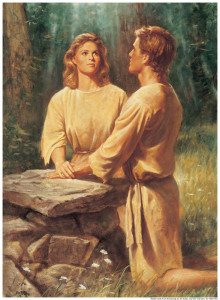The scriptures of the restoration offer new insights into the history of Adam and Eve. Many have held them accountable for all the suffering in the world, due to a single decision made in the Garden of Eden. In reality, we learn that we owe them our very existence.
22 And now, behold, if Adam had not transgressed he would not have fallen, but he would have remained in the garden of Eden. And all things which were created must have remained in the same state in which they were after they were created; and they must have remained forever, and had no end.
23 And they would have had no children; wherefore they would have remained in a state of innocence, having no joy, for they knew no misery; doing no good, for they knew no sin.
24 But behold, all things have been done in the wisdom of him who knoweth all things.
25 Adam fell that men might be; and men are, that they might have joy. (2 Nephi 2)
In the Garden, all things were the same all the time. Nothing bad happened. Nothing unusually good happened. Because they didn’t know sadness, they could never feel complete joy or appreciate what they had. They could not have children in the garden—any parent knows it’s impossible to raise a child without experiencing joy and sorrow.
We came here to be tested, but there can be no real test without the extremes of emotion available to us. And so, although Adam and Eve could have chosen to stay in the Garden forever, the choice to do so would have been both selfish and limiting. They would have missed out on all that makes mortality so fascinating and meaningful. They couldn’t have completed their trial properly staying in that perfect, carefully controlled world. And of course, no one else could have come here. They would have possessed the earth, in perfection, but all alone forever on an overly large planet. We could not join them in that state.
“Many questions have been asked: How much did Adam and Eve really understand about consequences of eating the forbidden fruit? Why was the message of Satan so tempting to Eve but not to Adam? Was there no other way? These are perplexing questions because we know so little about Adam and Eve’s thoughts and feelings in the garden. Therefore, we should not worry about what the scriptures and living prophets have chosen not to explain. The important thing is to know that the Lord’s will was accomplished. Adam and Eve kept the first commandment to multiply and replenish the earth. Their bodies were changed, and mortality, parenthood, and eventual death came upon them. Eternal family relationships became possible. The Fall was a “glorious necessity to open the doorway toward eternal life,” said Elder Dallin H. Oaks of the Quorum of the Twelve Apostles. As a result, we have been blessed with the opportunity to come to this earth.” (Jess L. Christensen, “The Choice That Began Mortality,” Ensign, Jan 2002, 36)
Unlike many people, members of the Church of Jesus Christ of Latter-day Saints honor Adam and Eve for the choices they made in the garden. We owe them our lives and honor them for choosing to become the parents of all who would come to earth after them, even when it meant hardship and suffering.
The late Terrie Lynn Bittner—beloved wife, mother, grandmother, and friend—was the author of two homeschooling books and numerous articles, including several that appeared in Latter-day Saint magazines. She became a member of the Church at the age of 17 and began sharing her faith online in 1992.





